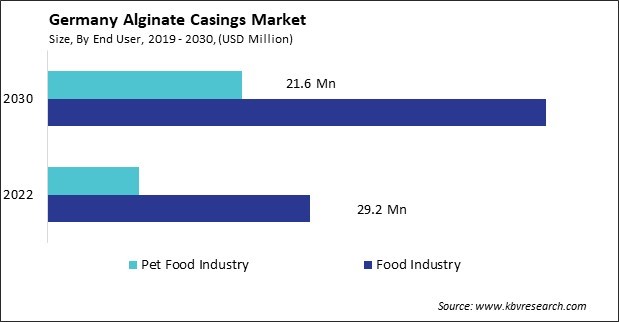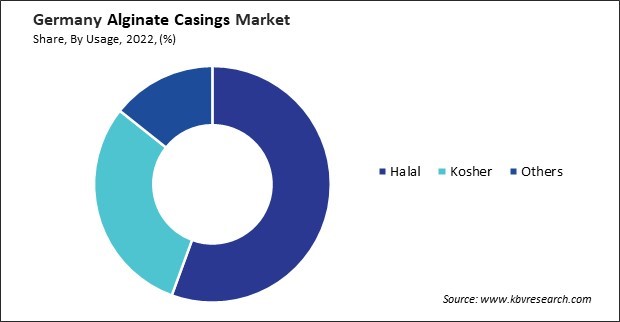Int'l : +1(646) 832-2886 | query@kbvresearch.com
Int'l : +1(646) 832-2886 | query@kbvresearch.com
Published Date : 02-Sep-2024 |
Pages: 51 |
Formats: PDF |
The Germany Alginate Casings Market size is expected to reach $77 Million by 2030, rising at a market growth of 8.9% CAGR during the forecast period.
The alginate casings market in Germany has witnessed steady growth over the years, primarily driven by the burgeoning food processing industry in the region. According to Germany Trade & Invest, the food processing industry, which ranked as the third-largest sector in Germany, demonstrated robust performance in 2019, with an estimated production value of USD 221.7 billion for processed food and beverages. This has led to widespread adoption across the food industry, particularly in sausage production, where they offer advantages such as improved texture, enhanced flavor retention, and ease of use.

One key driver of the growth of the alginate casings market in Germany is the rising demand for processed meat products. The shift towards healthier and more sustainable food options has also contributed to the increasing adoption of alginate casings. As German consumers become more conscious of their dietary choices and environmental impact, they seek products free from synthetic additives and chemicals. Alginate casings, being natural and biodegradable, drive their demand further in the German industry.
Moreover, stringent regulations and standards regarding food safety and hygiene have propelled the adoption of alginate casings among German food manufacturers. Alginate casings offer excellent barrier properties, preventing the growth of harmful microorganisms and extending the shelf life of perishable products. This makes them a preferred choice for ensuring the safety and quality of food products, especially in a highly regulated industry like Germany.
The COVID-19 pandemic has significantly impacted the alginate casings market in Germany. The pandemic disrupted supply chains, leading to shortages of raw materials and logistical challenges in transporting goods. Additionally, temporary closures of food processing facilities and restrictions on social gatherings and events resulted in a decline in demand for sausage products, among the primary applications of alginate casings. However, the pandemic highlighted the importance of food safety and hygiene, driving demand for packaged food products with extended shelf life and enhanced preservation properties.
Furthermore, the shift towards online shopping and home cooking during the pandemic has increased the demand for convenience foods. According to the International Trade Administration, in 2022, online shopping in Germany experienced robust growth, with total sales estimated at USD 141.2 billion, representing an impressive 11% increase compared to 2021. In 2022, the industry's online presence in Germany soared to a substantial 80%, securing its place as the third highest globally in terms of online industry penetration, further boosting the sales of sausage products packaged in alginate casings.
In Germany, the alginate casings market is experiencing a significant shift driven by a growing preference for clean-label products. One key factor propelling the demand for clean-label alginate casings is the increasing awareness among consumers regarding the impact of artificial additives on health. German consumers, renowned for their discerning taste and emphasis on quality, increasingly seek products that offer convenience and nutritional integrity. Alginate casings provide a viable solution as they offer the functionality required for meat and seafood processing while meeting clean label criteria.
Furthermore, the clean label trend is not confined to retail consumers but extends to food service establishments and manufacturers catering to a discerning clientele. According to the U.S. Department of Agriculture, there was a notable uptick in German food service sales in 2021, registering a 0.6% increase to $76 billion. Restaurants, delis, and food manufacturers are increasingly incorporating clean-label ingredients, including alginate casings, into their products to meet the evolving preferences of their customers.
Moreover, the demand for clean-label products is not solely limited to health-conscious consumers but also extends to environmentally conscious ones. Another driving force behind the preference for clean-label alginate casings is the influence of regulatory bodies and industry associations advocating for transparency and sustainability in food production. Hence, the surge in demand for clean-label alginate casings in Germany reflects consumer health concerns and a broader societal shift towards transparency and sustainability in food production.
In recent years, Germany has witnessed a remarkable surge in the demand for plant-based alternatives within the alginate casings market. One of the key factors fueling the demand for plant-based alginate casings in Germany is the rising popularity of vegetarian and vegan diets. As more Germans adopt these lifestyles, there is a corresponding need for meat substitutes that closely mimic traditional meat products' taste, texture, and appearance. Alginate casings offer an ideal solution, providing a versatile and sustainable option for encapsulating plant-based ingredients such as textured vegetable protein, pulses, and grains.
Moreover, the demand for plant-based alginate casings is also driven by food safety and quality concerns. With increasing scrutiny on the ingredients used in food products, German consumers seek assurances that their items are free from harmful additives and allergens. Furthermore, the trend towards sustainability is significantly shaping the alginate casings market in Germany.
As German consumers become more environmentally conscious, there is a growing preference for products with minimal ecological impact. Plant-based alginate casings, derived from renewable and biodegradable sources, fit well within this ethos, offering a greener alternative to traditional animal-derived casings. Therefore, the surge in demand for plant-based alginate casings in Germany is driven by the increasing popularity of vegetarian and vegan diets, concerns about food safety and quality, and a growing preference for sustainable options among environmentally conscious consumers.

The alginate casings market in Germany is shaped by a combination of factors, including the country's strong food processing industry, stringent quality standards, and growing consumer demand for sustainable packaging solutions. Several companies operate in this niche sector, offering a range of alginate-based casings to meet the diverse needs of food manufacturers and processors.
One significant player in this sector is Devro plc, a global leader in collagen casings for the food industry. While Devro is renowned for its expertise in collagen-based products, the company also has a presence in the alginate casings market. Devro leverages its manufacturing capabilities and technical expertise to produce high-quality alginate casings used in the packaging of sausages, meats, and other food products in Germany. With a focus on innovation and customer satisfaction, Devro contributes to advancing alginate-based packaging solutions in the German industry.
Another notable contender is Nitta Casings Inc., a subsidiary of the Nitta Corporation, a leading manufacturer of casings and films for the food industry. Nitta Casings produces a variety of casings, including alginate-based options, catering to the specific requirements of German food processors. With advanced manufacturing facilities and a commitment to quality control, Nitta Casings ensures that its products meet the highest standards of safety and performance in the German industry.
Moreover, companies like Viscofan GmbH significantly supply alginate casings to the German food industry. Viscofan is a global leader in producing and distributing artificial casings for the meat industry, offering a wide range of products, including cellulose, collagen, and alginate-based casings. Leveraging its advanced technology and expertise in food packaging, Viscofan GmbH provides innovative solutions that meet the evolving needs of German food manufacturers and processors.
Furthermore, collaborations between industry players, research institutions, and government agencies drive innovation and knowledge exchange in the German alginate casings market. These companies are vital in supplying high-quality packaging solutions to the German food industry, ensuring product safety, quality, and sustainability. With ongoing research and technological advancements, the industry for alginate-based casings is expected to grow and evolve in Germany.
By End User
By Usage
By Application
By Type